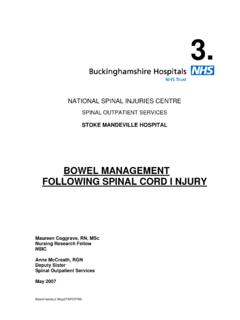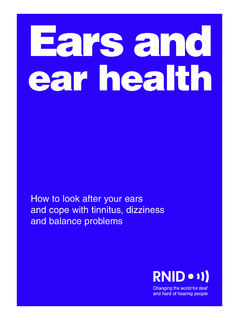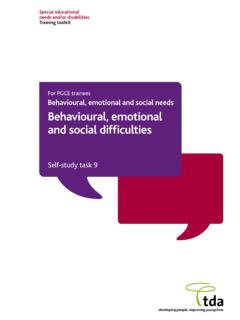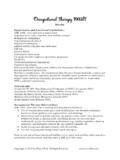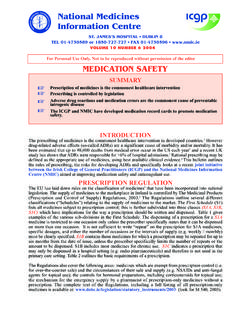Transcription of Developing essential skills for writing: An …
1 Developing essential skills for writing : An intervention for children with complex learning needs Foreword Ready, Steady .. Write! was established through the positive blending of two professional services - Down syndrome Support Team, Specialist Teaching Service and the Paediatric Occupational Therapy Service, working to complement expertise in specialist fields. Special thanks go to Julie Hooton (Specialist Teacher for Children with Down Syndrome) and Catriona Johnstone (Specialist Paediatric Occupational Therapist) for their input into the programme, and to Fiona Thompson from Symbol UK Speech and Language Therapy Service for her help with the auditory attention and memory section.
2 Please refer back to the Paediatric Occupational Therapy Service or the Down Syndrome Support Team, Specialist Teaching Service for future updating of the document, so that it can be of benefit to others. Paediatric Occupational Therapy Service Specialist Teaching Service Oakridge Centre Wycombe Area Office 240 Desborough Road Easton Street High Wycombe High Wycombe Bucks Bucks HP11 2QR HP11 1NH. Tel: 0844 2252389 Tel: 01494 475199. 1. Page 3 Introduction 5 Instructions for Use 7 Week 1 Record sheet 8 Week 2 Record sheet 9 Week 3 Record sheet 10 Week 4 Record sheet 11 Week 5 Record sheet 12 Week 6 Record sheet 13 essential Skill Area 1 - Core Stability 15 essential Skill Area 2 - Pen/ Pencil Grasp 17 essential Skill Area 3 - Auditory attention and memory 18 essential Skill Area 4 - Visual Perception 20 essential Skill Area 5 - writing Patterns 23 Appendix 1 - Good Practice Tips and Strategies 24 Appendix 2 - Resources 2.
3 Introduction Ready, Steady .. Write was developed for children and young people with complex learning needs who struggle to acquire the essential skills necessary, to be able to write by hand and to make written progress in all curriculum areas. Through use of this programme, children and young people will improve their ability to produce fluent, spontaneous and legible handwriting. Handwriting is a complex skill which requires the integration of a large number of skills . It has been developed for children and young people with Downs Syndrome, but will also benefit children with a range of other educational needs.
4 This is a working document aiming to develop 5 areas of skill. These need to be practised regularly, some areas more than others, depending on the child. These 5 areas are: 1 - Core Stability Wake up the body Imagine a crane on a building project, the long arm can only function if the base is stable. In the same way a child's hand can only produce neat handwriting if the rest of the body is stable enough to allow for it. 2 - Pen/Pencil Grasp and Strengthen the hand. Fluidity of Movement The arches in the hand provide stability for action. A child must have sufficient strength and stamina in the intrinsic muscles of the hand to allow for holding and skilfully manoeuvring the pen or pencil.
5 3. 3 Auditory (Listening) Tune in the ears Attention and Memory Remember that memory is not a muscle but does respond to strengthening in the same way as the hands. The ability to process, discriminate and retain auditory information is essential to appreciating the relevance of communicating through writing . 4 - Visual Perception Focus the eyes Although our eyesight may be good, learning to form letters requires interpreting correctly what is seen, for example, distinguishing between a vertical line and a diagonal line, an a'. and c'. 5- writing Patterns (inc letter formation) and W R I T E ! Often the teaching emphasis and expectations are on the writing patterns when in fact other skills have not been acquired and are not functioning effectively in order for writing patterns and letter formations to take place.
6 4. Instructions for use Refer to pages 13-22 which detail the 5 essential skill area activities. Choose 1 activity from each essential skill area. The chosen activity from each essential skill area is to be practised daily for a week. All 5 activities should last approximately 10 minutes per day in total, with other pupils included within a group wherever appropriate in order to maximise inclusion. Record progress daily on the sheet provided, Pages 7-12. It is recommended that feedback from each activity is included, with references to achievements, strengths and possible areas for future reinforcement.
7 Each week these activities are changed and the intervention should be planned to last 6 weeks, then evaluated for future planning with a clear understanding of building on success, sensitively identifying weaknesses or gaps in skill development and reinforcing as necessary. When planning consider carefully the sequence of activities, for example, some gross motor core stability practice may be far more appropriate to develop thoroughly in the early stages leading to fine motor pencil grip practice. Wherever possible, the activities have been put into hierarchical order in each section in order to help in this choice.
8 Keep activities as meaningful and enjoyable as possible, incorporating them into relevant class work and Speech and Language Therapy tasks if appropriate. When working with older pupils, careful planning is needed to ensure the activities are appropriate or modified to be age appropriate. It is recommended that a store in the form of a box or crate is made available with all planned and required resources ready for each week's activities. 5. Hand strengthening resources can be stored in a separate box to form a hand gym' for regular access by the child to build up strength. This can be especially useful when they have worked out their hand dominance ( left or right handed), as more emphasis can be placed on strengthening the hand likely to be used for writing .
9 At the end of each essential skill area, spaces have been left by educational staffs to add tips, activities and NB. Every time resources which from experience have worked well. we perform a particular motor sequence or Parents should be consulted and, where appropriate, movement, the neural pathway (the connections made involved in supporting the learning and development of between the brain and the muscles involved) is reinforced again their child as an integral part of this intervention. To and again. We get better at performing the eventually maximise inclusion in school time, it may be worthwhile for embedded movement some of the activities to be reinforced at home by which develops in a continuous process from parents.
10 Birth to adulthood. Teachers may wish to use this in conjunction with the PIVATS (English- writing ) to establish a baseline for assessment and monitor progress. This can be found using the following link 6. Record Sheet Name: Start Date: WEEK 1. ACTIVITY (these 5. essential activities should be FEEDBACK/COMMENTS. SKILL AREA practised daily & in total for future planning when should last approx. 10. completed minutes). M. T. Core Stability W. Th F. M. Pen/Pencil T. Grasp W. Th F. M. Auditory T. Attention/ W. Memory Th F. M. Visual T. Perception W. Th F. M. writing T. patterns W. Th F. 7. Record Sheet Name: Start Date: WEEK 2.
